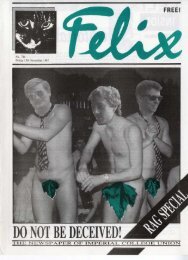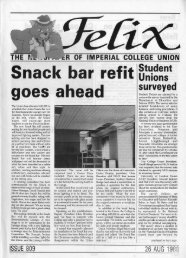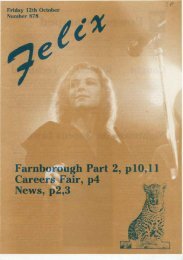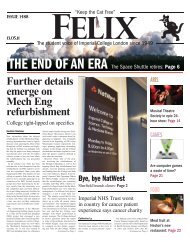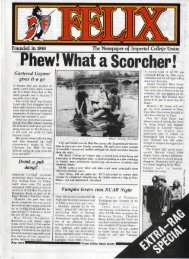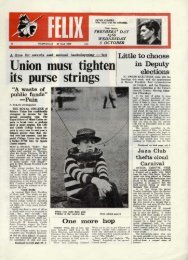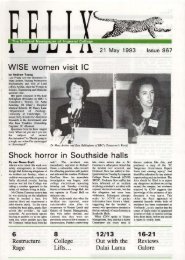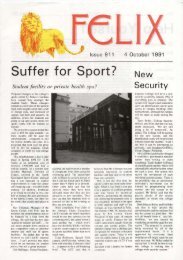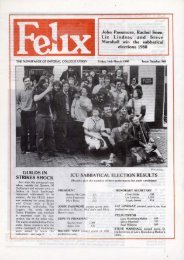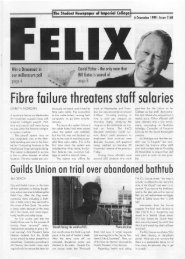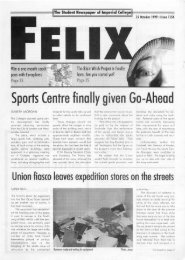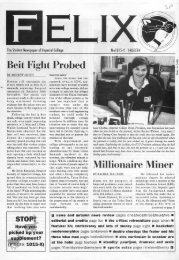773 Friday 29th May - Felix
773 Friday 29th May - Felix
773 Friday 29th May - Felix
You also want an ePaper? Increase the reach of your titles
YUMPU automatically turns print PDFs into web optimized ePapers that Google loves.
Features FELIX, <strong>Friday</strong> <strong>May</strong> <strong>29th</strong> 1987 8<br />
Leave It<br />
Alone<br />
Will the person who continuously<br />
removes posters/notices from the<br />
Appropriate Technology notice board<br />
in the Union foyer please refrain from<br />
doing so. You might not agree with<br />
the Society or its aims but please<br />
respect our opinions and publicity.<br />
Yours,<br />
Hugh Rubin, Ap-Tech Chair<br />
Opsoc<br />
refuse to<br />
do Gilbert<br />
& Sullivan<br />
Shocker<br />
Good morning everyone, and good<br />
luck with your exams.<br />
Yes, OpSoc has returned to you<br />
from the grave where we were all<br />
lying dead after the Marathon. This<br />
act of charitable stupidity lasted 29<br />
hours altogether; aaaaah. (And that's<br />
what the singing sounded like by the<br />
end).<br />
We will not, however, stop because<br />
of tiredness. On the second day after<br />
the Marathon we had our first<br />
rehearsal for Patience, the show we<br />
are taking on tour to Budleigh<br />
Salterton for a fortnight this summer.<br />
There is a separate membership fee<br />
for tour, and as there are no auditions<br />
for members of the chorus, why don't<br />
you come along each Tuesday at<br />
7.30pm in the Music Room 53<br />
Prince's Gate.<br />
There is also an event arriving soon<br />
which is open to the rest of you fools<br />
who aren't members of this<br />
splendiferous club; two visits to see<br />
the English National Opera. We are<br />
getting seats in the Upper Circle at<br />
£10.50. The productions we intend to<br />
see are:<br />
Sat 13th June 7pm—Lady Macbeth<br />
of Mtsensk-Shostakovich<br />
Thur June 18th 7.30pm, Orpheus<br />
in the Underworld-Offenbach<br />
If enough people come to see<br />
Orpheus, we may get a reduction on<br />
the seat prices as it is one of their<br />
'party' days (no hats provided); so all<br />
of you out there contact P Murphy,<br />
Civ Eng I by June 2nd, (I'm passing<br />
the buck again).<br />
See you at rehearsals, (by the way,<br />
Oscar has promised to buy a drink for<br />
the first person on the trip who knows<br />
how to say Mtsensk).<br />
In the sweltering heat of the Holy Land thousands<br />
died in the taking of Jerusalem. A war to change<br />
the face of Europe forever—just 700 years after the<br />
event FELIX brings you all the news on the<br />
Crusades.<br />
Just Another Knight<br />
In the 11th Century, it was<br />
fashionable in Europe to go on<br />
pilgrimage to Jerusalem and the Holy<br />
Land. It was a long and difficult<br />
journey, but the route there was kept<br />
open by the Byzantine Empire and the<br />
Moslems, who held Jerusalem,<br />
tolerated the pilgrims. But in the<br />
second half of the century, the Selljuk<br />
Turks invaded the Byzantine Empire<br />
and took Jerusalem from the more<br />
tolerant Moslems who had held it<br />
previously. The Turks harassed and<br />
maltreated the pilgrms and this,<br />
coupled with calls for help from the<br />
Byzantines, gave rise to the crusades.<br />
Thousands of people in Europe<br />
took the cross and an expedition was<br />
organised which in 1099, captured<br />
Jerusalem. Four crusader states were<br />
thus established in the Holy Land.<br />
Who went on crusade and why did<br />
they do it? Firstly, a great number of<br />
common people took the cross mainly<br />
out of genuine religious zeal, but there<br />
were other factors: Life for common<br />
people in Europe at the time was very<br />
grim. The vast majority were peasants<br />
who were at the mercy of a harvest<br />
that regularly failed, and of private<br />
wars between the barons in which<br />
their crops were burned, their hovels<br />
raided and their relatives carried off<br />
into slavery or simply murdered. The<br />
other main group who went crusading<br />
were the lesser nobility. Though<br />
religion also played a part, they went<br />
to get new lands in the East. They<br />
were mainly the younger sons of great<br />
barons who were unlikely to succeed<br />
to any lands in Europe. Indeed, many<br />
of the crusaders were Normans,<br />
whose kin had recently conquered<br />
England for precisely that reason.<br />
Once the four crusading states had<br />
been set up, but what later became<br />
known as the First Crusade, many of<br />
the crusaders felt they had done their<br />
bit and went home. The states, the<br />
Kingdom of Jerusalem, the<br />
Principality of Antioch and the<br />
counties of Tripoli and Edessa, had<br />
to be defended with a very small<br />
number of men. To do this, the<br />
cursaders built many castles. Since<br />
the lack of water and the heat of the<br />
East made it difficult to keep armies<br />
in the field for long, siege warfare<br />
was very important and the walled<br />
cities and castles were thus more<br />
formidable and bigger than those in<br />
Europe.<br />
The Land Beyond the Sea or<br />
War Correspondent, Francif Myerf<br />
Outremer, as it was called in medieval<br />
French, was always short of men.<br />
Few enough had stayed in the Holy<br />
Land after the first crusade, but the<br />
shortage was aggravated by the fact<br />
that the crusaders knew little about<br />
sanitation, and while they could get<br />
away with their habits in Europe, they<br />
died of every kind of disease in the<br />
heat of the East.<br />
One of the ways used to combat the<br />
manpower shortage was the<br />
foundation early on in crusading<br />
history of the military orders. These<br />
were religious order of knights sworn<br />
to poverty, chastity and obedience and<br />
to defending the holy places.<br />
European nobles, rather than<br />
undertaking the difficulty and expense<br />
of crusading themselves, could salve<br />
their consciences by endowing one of<br />
the military orders. They were also<br />
excellent ways of getting restless and<br />
troublesome younger sons out of the<br />
way. The military orders soon<br />
became rich, with assets all over<br />
Europe as well as in Outremer. The<br />
main orders were the Templars and<br />
Hospitallers. It is from the Templars<br />
that the well known image of the<br />
knight with a red cross on a white<br />
surcoat originated. The Hospitallers<br />
were a white cross on black.<br />
Sometime after the foundation of the<br />
Templars and Hospitallers, German<br />
crusaders, who felt that these orders<br />
were dominated too much by the<br />
French, founded a third order, the<br />
Teutonic Knights<br />
The history of civilisation goes<br />
back a lot further in the levant than<br />
in Europe, and when the crusaders<br />
first arrived, they were regarded as<br />
uncultured barbarians even by the<br />
native christians whom they had<br />
liberated from Moslem rule.<br />
Moreover, the native christians who<br />
had been living in the Holy Land<br />
since the time of Christ followed a<br />
slight different creed from the<br />
crusaders and this added to the<br />
friction.<br />
The precariousness of their<br />
situation meant that the crusading<br />
states could not last long. In 1187 the<br />
Moslems under Aaladin recaptured<br />
Jerusalem after the disastrous battle<br />
of Hattin. This finished the Kingdom<br />
of Jerusalem after only eighty-eight<br />
years. It provoked the Third Crusade,<br />
which though it failed to recover<br />
Jerusalem, prolonged the crusader's<br />
existence for another hundred years.<br />
Over the hundred years, what was left<br />
of crusaders' lands was gradually<br />
whittled away, until in 1291, the last<br />
crusader town fell.<br />
The crusaders make a wonderful<br />
story and have left their mark on<br />
Palestine in the shape of many<br />
spectacular ruins. But it must not be<br />
forgotten that they were essentially a<br />
great act of intolerance that did no one<br />
any long term good.



